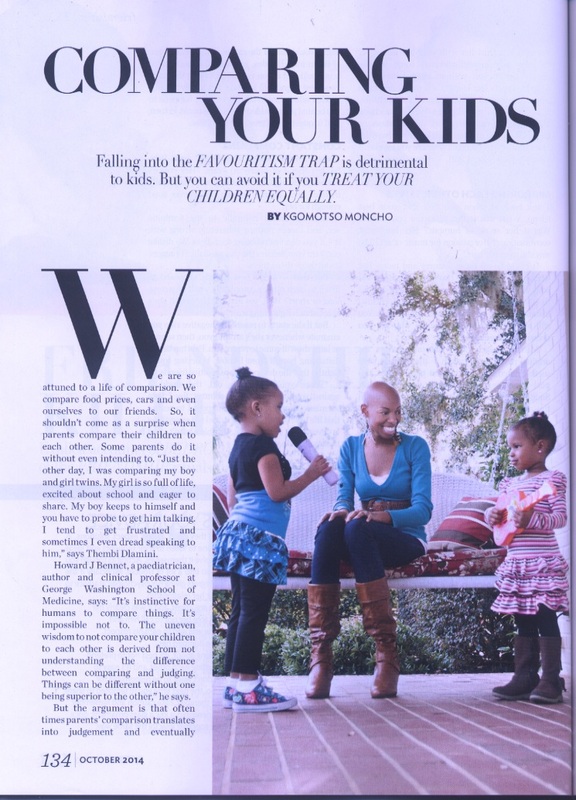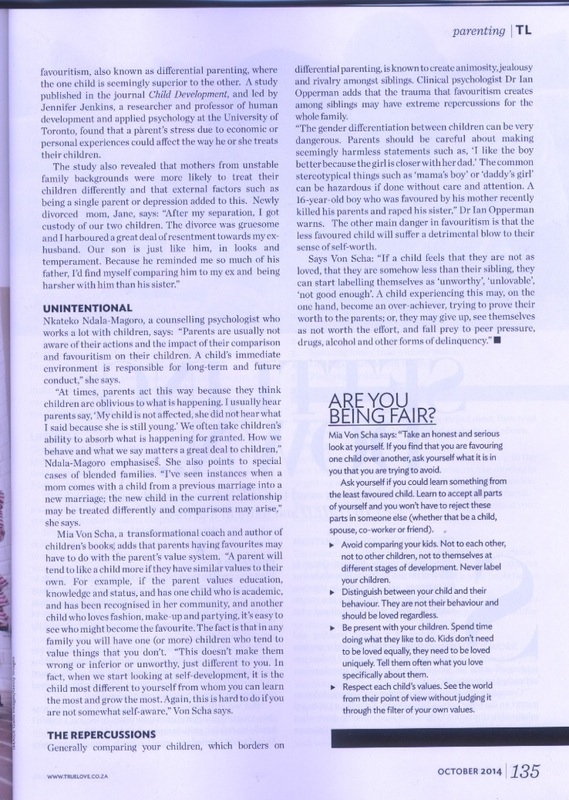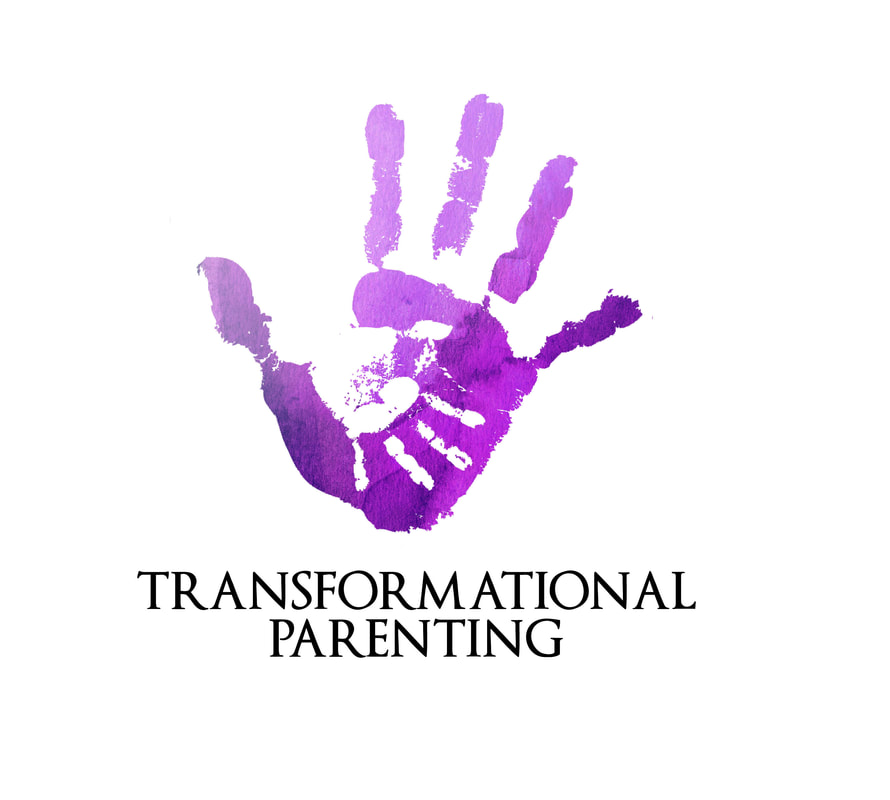
Mia Von Scha chats to Kgomotso Moncho of True Love magazine about the effects of having favourites amongst our children - how we all do this to some degree at some time, how we can be conscious of it, and how we can protect our kids from the negative effects of comparing your kids.
1. What are the dangers of favouritism in your kids? What can happen?
The main danger in favouritism is that the unfavoured child will suffer a blow to their sense of self-worth. Our self-worth is responsible for our overall success, creativity, confidence, happiness and inner peace. A positive sense of self worth allows us to explore the world and try new things, to fulfill our dreams, to avoid peer pressure and to feel loved and loveable. If a child feels that they are not as loved, that they are somehow less than their sibling, they can start labelling themselves as 'unworthy', 'unlovable', 'not good enough', etc. In my experience of coaching adults, the majority of their problems come from these kinds of limiting beliefs about themselves. Having one of these beliefs will hamper your relationships, career, friendships, health and general well being in life. A child experiencing this may, on the one hand, become an over-achiever, trying to prove their worth to the parent/s. (Just as a side note, the favoured child may also end up with self-worth issues, believing that there is something that they DO that makes them favoured and therefore trying desperately to hang onto this status.) Or, they may give up, see themselves as not worth the effort, and fall prey to peer pressure, drugs, alcohol, and other forms of delinquency.
2. What tends to be the reasons behind parents falling into this?
We all have times where we favour one child over another. Children go through different phases and some of these can be extremely challenging. It is easier to get on with and 'like' the child not going through a difficult phase or one who has a naturally more cooperative temperament. These are usually transitory fluctuations in the way that we like our children (note this does not mean that we love one more than another, but that they're easier to get on with at that time) and can change from day to day or month to month.
Long-term favouritism usually comes from a parent who has not accepted all parts of themselves. We will all project the parts of ourselves that we are too humble or too proud to admit that we have onto the people around us. For example, all people are sometimes stingy and sometimes generous (these are both natural human traits that we all have in some form). But if you are too proud to admit that you are ever stingy, you may project this 'undesirable' trait onto one of your children. You then place a label on that child and judge them as being 'less than' the child in whom you have projected more satisfying traits. And the more we label someone, the more we tend to only see that side of them, instead of seeing them for the whole person that they truly are.
Another reason that a parent may have favourites has to do with the parent's values. A parent will tend to like a child more if they have similar values to their own. For example, if the parent values education, knowledge and status, and has one child who is academic, head girl, and has been recognised in her community, and another child who loves fashion, make-up and partying, it is easy to see who might become the favourite. The fact is, that in any family you will have one (or more) children who tend to value things that you don't. This does not make them wrong or inferior or unworthy, just different to you. In fact, when we start looking at self-development, it is the child most different to yourself from whom you can learn the most and grow the most. Again, this is hard to do if you are not somewhat self-aware.
3. How can they avoid it?
The best way to avoid this is to seriously look at yourself. If you find that you are favouring one child over another, ask yourself what it is in yourself that you are trying to avoid. Ask yourself if you could learn something from the least favoured child. Learn to accept all parts of yourself and you won't have to reject these parts in someone else (whether that be a child, spouse, co-worker or friend). Everyone in our lives, and particularly our children, can help us to grow as human beings and to find wholeness. If you're struggling to do this on your own (and often it is very difficult to see our own flaws objectively) then work with a friend, coach or therapist to uncover what is really going on.
4. What useful parenting tips can help with this issue?
- Never compare your kids. Not to each other, not to other children, not to themselves at different stages of development.
- Never label your children. Your labels are YOURS, not who THEY are. Labels applied enough times become internalised and dictate how kids see the world.
- Distinguish between your child and their behaviour. They are not their behaviour and should be loved regardless. Focus on the internal qualities of your child, not their external achievements.
- Be present with your children. Spend quality one-on-one time with each child every day. Spend time doing what THEY like to do – in other words your time with each child will be different. Children don't need to be loved equally, they need to be loved uniquely. Tell them often what you love specifically about them.
- Respect each child's values, what is important to them. Explore it with them, get excited about what they get excited about, see the world from their point of view without judging it through the filter of your own values.
5. Anything else you'd like to add?
Every child is a unique individual, different from everyone else and from themselves yesterday, and learning and growing at their own pace. Appreciate each child for who they are in this moment, knowing that they (and you) will change as time goes on. Every child deserves your love, regardless of what they are going through at the time.
The main danger in favouritism is that the unfavoured child will suffer a blow to their sense of self-worth. Our self-worth is responsible for our overall success, creativity, confidence, happiness and inner peace. A positive sense of self worth allows us to explore the world and try new things, to fulfill our dreams, to avoid peer pressure and to feel loved and loveable. If a child feels that they are not as loved, that they are somehow less than their sibling, they can start labelling themselves as 'unworthy', 'unlovable', 'not good enough', etc. In my experience of coaching adults, the majority of their problems come from these kinds of limiting beliefs about themselves. Having one of these beliefs will hamper your relationships, career, friendships, health and general well being in life. A child experiencing this may, on the one hand, become an over-achiever, trying to prove their worth to the parent/s. (Just as a side note, the favoured child may also end up with self-worth issues, believing that there is something that they DO that makes them favoured and therefore trying desperately to hang onto this status.) Or, they may give up, see themselves as not worth the effort, and fall prey to peer pressure, drugs, alcohol, and other forms of delinquency.
2. What tends to be the reasons behind parents falling into this?
We all have times where we favour one child over another. Children go through different phases and some of these can be extremely challenging. It is easier to get on with and 'like' the child not going through a difficult phase or one who has a naturally more cooperative temperament. These are usually transitory fluctuations in the way that we like our children (note this does not mean that we love one more than another, but that they're easier to get on with at that time) and can change from day to day or month to month.
Long-term favouritism usually comes from a parent who has not accepted all parts of themselves. We will all project the parts of ourselves that we are too humble or too proud to admit that we have onto the people around us. For example, all people are sometimes stingy and sometimes generous (these are both natural human traits that we all have in some form). But if you are too proud to admit that you are ever stingy, you may project this 'undesirable' trait onto one of your children. You then place a label on that child and judge them as being 'less than' the child in whom you have projected more satisfying traits. And the more we label someone, the more we tend to only see that side of them, instead of seeing them for the whole person that they truly are.
Another reason that a parent may have favourites has to do with the parent's values. A parent will tend to like a child more if they have similar values to their own. For example, if the parent values education, knowledge and status, and has one child who is academic, head girl, and has been recognised in her community, and another child who loves fashion, make-up and partying, it is easy to see who might become the favourite. The fact is, that in any family you will have one (or more) children who tend to value things that you don't. This does not make them wrong or inferior or unworthy, just different to you. In fact, when we start looking at self-development, it is the child most different to yourself from whom you can learn the most and grow the most. Again, this is hard to do if you are not somewhat self-aware.
3. How can they avoid it?
The best way to avoid this is to seriously look at yourself. If you find that you are favouring one child over another, ask yourself what it is in yourself that you are trying to avoid. Ask yourself if you could learn something from the least favoured child. Learn to accept all parts of yourself and you won't have to reject these parts in someone else (whether that be a child, spouse, co-worker or friend). Everyone in our lives, and particularly our children, can help us to grow as human beings and to find wholeness. If you're struggling to do this on your own (and often it is very difficult to see our own flaws objectively) then work with a friend, coach or therapist to uncover what is really going on.
4. What useful parenting tips can help with this issue?
- Never compare your kids. Not to each other, not to other children, not to themselves at different stages of development.
- Never label your children. Your labels are YOURS, not who THEY are. Labels applied enough times become internalised and dictate how kids see the world.
- Distinguish between your child and their behaviour. They are not their behaviour and should be loved regardless. Focus on the internal qualities of your child, not their external achievements.
- Be present with your children. Spend quality one-on-one time with each child every day. Spend time doing what THEY like to do – in other words your time with each child will be different. Children don't need to be loved equally, they need to be loved uniquely. Tell them often what you love specifically about them.
- Respect each child's values, what is important to them. Explore it with them, get excited about what they get excited about, see the world from their point of view without judging it through the filter of your own values.
5. Anything else you'd like to add?
Every child is a unique individual, different from everyone else and from themselves yesterday, and learning and growing at their own pace. Appreciate each child for who they are in this moment, knowing that they (and you) will change as time goes on. Every child deserves your love, regardless of what they are going through at the time.


